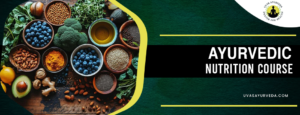Ayurvedic nutrition is an ancient way of eating from India that believes food is not just fuel but also medicine for our bodies. It teaches us to balance our energies, called doshas, to stay healthy and happy. There are three doshas: Vata, Pitta, and Kapha. Each person has a unique mix of these energies, which affects what foods are best for them.
Vata: Governs movement and is associated with qualities like dryness, coldness, and lightness.
Pitta: Governs metabolism and is associated with qualities like heat, intensity, and sharpness.
Kapha: Governs structure and is associated with qualities like heaviness, stability, and lubrication.
Ayurvedic nutrition aims to balance these doshas through diet and lifestyle choices. Here’s a simplified breakdown:
For Vata imbalance: Favor warm, moist, and grounding foods like cooked grains, root vegetables, nuts, and seeds. Avoid cold, raw, and dry foods.
For Pitta imbalance: Favor cooling and hydrating foods like fresh fruits, leafy greens, cucumber, and coconut. Avoid spicy, oily, and acidic foods.
For Kapha imbalance: Favor light, warm, and stimulating foods like legumes, bitter greens, spicy herbs, and fruits. Avoid heavy, oily, and sweet foods.

In Ayurvedic nutrition, food is grouped into six tastes: sweet, sour, salty, bitter, pungent, and astringent. Each taste affects our bodies differently. For example, sweet foods can calm us down, while sour and salty foods might make us feel more intense emotions. Bitter and astringent tastes can But it’s not just about eating the right foods; it’s also about how you eat them. Ayurveda pays a lot of attention to digestion, which is like the engine that powers your puzzle. If your digestion is strong, you’ll get the most out of your food and feel great. That’s why Ayurveda recommends things like chewing your food well, eating in a calm environment, and avoiding distractions while you eat. help balance us out if we’re feeling sluggish or heavy.
Another important idea in Ayurveda is eating foods that match the seasons and our environment. In winter, when it’s cold and dry, we might eat warm, comforting foods like soup and stew. But in summer, when it’s hot, we might prefer cooler foods like salads and fruits.
Spices play a significant role in both nutrition and Ayurveda, the ancient Indian system of medicine and holistic wellness.
Enhanced Flavor and Taste: Spices add flavor and aroma to our food, making it more enjoyable to eat. This enhances our appetite and encourages us to consume a wider variety of foods, which is crucial for obtaining diverse nutrients.
Digestive Aid: Many spices, such as ginger, cumin, coriander, and fennel, have digestive properties. They help stimulate the digestive fire (agni) according to Ayurveda, which aids in the proper digestion and assimilation of nutrients from food. This prevents digestive issues like bloating, gas, and indigestion.
Balancing Doshas: According to Ayurveda, there are three doshas or bio-energies (Vata, Pitta, and Kapha) present in everyone, and maintaining their balance is key to good health. Certain spices have properties that can help balance specific doshas. For example:
Vata-balancing spices: Ginger, cinnamon, and cardamom.
Pitta-balancing spices: Coriander, fennel, and mint.
Kapha-balancing spices: Black pepper, turmeric, and mustard seeds.
Antioxidant Properties: Many spices are rich in antioxidants, which help neutralize harmful free radicals in the body. For example, turmeric contains curcumin, a powerful antioxidant known for its anti-inflammatory properties.
Anti-inflammatory Effects: Chronic inflammation is linked to various diseases like heart disease, cancer, and diabetes. Some spices, such as turmeric, ginger, and cinnamon, have anti-inflammatory properties that can help reduce inflammation in the body and lower the risk of chronic diseases.
Blood Sugar Regulation: Certain spices, like cinnamon and fenugreek, have been shown to help regulate blood sugar levels. They can improve insulin sensitivity and reduce insulin resistance, making them beneficial for individuals with diabetes or those at risk of developing it.
Antimicrobial Properties: Many spices possess antimicrobial properties that can help fight against harmful bacteria, viruses, and fungi. For instance, garlic and cloves have natural antibacterial properties that can help prevent infections and promote overall health.
In Ayurveda, different vessels play crucial roles in nutrition by influencing how food is prepared, stored, and consumed. Clay vessels are believed to impart cooling properties to food, enhancing digestion and balancing Pitta dosha. Copper vessels are thought to purify water and aid in digestion, while also potentially boosting the immune system. Iron vessels are valued for their ability to increase hemoglobin levels and improve overall health. Stainless steel vessels are commonly used for cooking as they are durable and non-reactive, preserving the nutritional integrity of food. Each vessel in Ayurveda is chosen carefully to optimize nutrient absorption, promote digestive health, and maintain balance in the body.
Mindful eating is also a big part of Ayurvedic nutrition. This means paying attention to how we eat and what we eat. By slowing down and tasting our food, we can digest it better and feel more satisfied. It’s like giving our bodies a chance to fully enjoy and use the nutrients in our food.
Ayurvedic nutrition isn’t just about food, though. It’s also about how we live our lives. Getting enough sleep, moving our bodies, and managing stress are all important for staying healthy. Sleep helps our bodies rest and recharge, while exercise keeps us strong and flexible. Finding ways to relax, like meditation or deep breathing, can calm our minds and reduce stress.
To sum it up, Ayurvedic nutrition is a way of eating that focuses on keeping our bodies balanced and healthy. By understanding our dosha type, choosing the right foods for the season, and practicing mindful eating and healthy living habits, we can nourish our bodies, minds, and spirits for a happier, healthier life.
We at Uvas Ayurveda offer online and offline Nutrition courses.


Leave A Comment